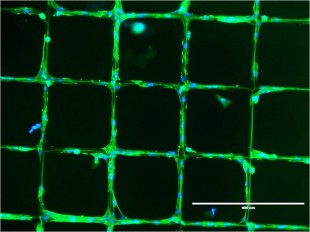Rice chemist will research patterned collagen scaffolds at Max Planck Institute
Rice University chemist Eugene Zubarev is preparing for a summer research experience at the Max Planck Institute of Colloids and Interfaces in Potsdam, Germany, after becoming the first Rice faculty member to win a Friedrich Wilhelm Bessel Research Award from the Alexander von Humboldt Foundation.
Bessel Award winners are nominated by German host researchers to live and study in Germany. The awards are open worldwide to scholars from all disciplines in recognition of their outstanding accomplishments in research and their exceptional promise for the future. Zubarev, associate professor of chemistry and materials science and nanoengineering, was one of only two U.S. chemists to win the award this year.
Zubarev said the award will give him an opportunity to pursue an extraordinarily promising line of research that sprang partly from a chance conversation between a member of his research group and another on the same floor at Rice’s BioScience Research Collaborative.
In experiments last year, Zubarev and his students found they could coax gold nanowires to self-assemble into precise hexagonal patterns by depositing droplets of solutions containing nanowires onto a surface and evaporating water from the droplets in the presence of a hexagonal template.
“Ph.D. student Paul Derry was speaking about our work to Vivek Kumar, a postdoc in Jeff Hartgerink‘s group, and mentioned that it would be interesting to try other materials, including biological polymers,” Zubarev said. Kumar suggested trying the experiment with collagen, a ubiquitous structural protein in animal tissue.

Studies conducted in the lab of Rice chemist Eugene Zubarev have found that live cells (green and blue) adhere to and migrate along patterned collagen structures. Credit: E. Zubarev/Rice University
According to Zubarev, the resulting experiments, which have yet to be published, have produced regular patterns of collagen fibers that could work as two-dimensional scaffolds in both tissue engineering and studies of live cells.
“Cells have an affinity for collagen, which is the primary component of extracellular matrix,” Zubarev said. “We’ve already recorded some striking results related to cellular adhesion, migration and proliferation.”
Zubarev said he’ll continue the research in Potsdam this summer with Markus Antonetti, co-director of the Max Planck Institute of Colloids and Interfaces, and with other colleagues at the institute.
“The institute will be the perfect place for me to spend some time and speak with experts in biomaterials,” Zubarev said. “They have groups that work specifically with collagen-based materials.”
The official award presentation will be June 11 at the Humboldt Foundation‘s Annual Meeting in Berlin. According to the foundation, the Bessel Award is limited to researchers who “completed their doctorates less than 18 years ago and who in the future are expected to continue producing cutting-edge achievements that will have a seminal influence on their discipline beyond their immediate field of work.”



Leave a Reply